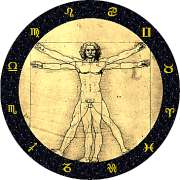Weboteric - Astrology
|
 |

Astrology - Jupiter
King of the Gods
Be gracious, all-seeing Son of Cronos, most excellent and great!
Its symbol represents the crescent of receptivity waxing as a focus of material activity.
Mythology
One of the brightest planets in the sky, Jupiter was noted by ancient astronomers as the only object that travels across the entire celestrial sphere.
The ancient Egyptian god Ammon, depicted as a man with a rams head, eventually became the King of the Greek gods, Zeus, the son of Cronus (Saturn).
Zeus was the supreme being living on Mount Olympus where he ruled over the society of gods.
Zeus was omnipotent and to mortals he dispensed good and evil from the jars placed at the gate of his palace. He was responsible for punishing the murderers as well as protecting the weak.
The Romans transformed Zeus into Jupiter or, in Latin, Iovis - Jove, from where we get the word Jovial.
Effects of Jupiter
Astrologically Jupiter is known as THE GREATER BENEFIC as it has a warmer nature than Saturn but is not as hot as Mars and, with the addition of moisture, is fertile and thus beneficial to the Earth. It represents WISDOM. It is a planet of freedom, tolerance and plenty.
From this planet all good things come and it is seen as avuncular, jolly, moderate and kind. As Jupiter takes 12 years to orbit the Sun, it spends one year in each Sign. Therefore, its influence in the horoscope is more inclined to the collective rather than personal.
It represents the drive for insight on an intellectual, philosophical and religious level. Jupiter is said to bring great good fortune, and its influence is to expand the effect of everything it comes into contact with.
Jupiter rules the law and moral authority, and our attitude to these issues. It brings a strong desire for understanding and the tendency to have powerful opinions and convictions.
How Jupiter will manifest its energy depends on the horoscope as a whole. The Sign (and its Element), the House in which if falls, and the Aspects to the other planets will all have a bearing on any interpretation.
Jupiter is the largest planet in the solar system with its own cosmos of moons orbiting and its influence is to expand the effect of everything it comes into contact with.
The Zodiac Sign Jupiter is in represents cultural influences
and social drives for expansion and improvement.
The Astrological House Jupiter is in shows where there will be good fortune
and expansion in your personal life. This Astrological House position will
indicate the specific area in life in which you gain insight and grow in understanding.
This area will generally be very fortunate for you.
The aspects Jupiter makes shows a psychological identity characteristic where the need for expansion, influence and understanding is paramount. These aspects show the specific personal drives where the search for wisdom is most intense.
Jupiter Key Facts |
|
Rules: |
|
Detriment: |
|
Exhalt: |
|
Fall: |
|
Colours: |
Imperial purple, violet, blends of red and indigo |
Stones & Metals: |
Amethyst, topaz, turquoise and tin |
Keywords: |
Justice, law, honour and truth |
Astronomy
Jupiter is the fifth planet from the Sun and by far the largest being than twice as massive as all the other planets combined. Its mass is over 300 times that of the Earth. The planet is composed of gas that increases in pressure and density as it gets nearer the core.
Galileo's discovery, in 1610, of Jupiter's four large moons Io, Europa, Ganymede and Callisto (now known as the Galilean moons) was the first discovery of a centre of motion not apparently centred on the Earth.
Daylength (rotation) |
9.8 Hours |
||||||||||||||||||||||||||||||||||||||||||||||||||||||
Year length |
11.86 Years |
||||||||||||||||||||||||||||||||||||||||||||||||||||||
Distance from the sun (average) |
483.6 million miles (778.4 Million KM) |
||||||||||||||||||||||||||||||||||||||||||||||||||||||
Distance from Earth (shortest) |
390.7 million miles (628 Million KM) |
||||||||||||||||||||||||||||||||||||||||||||||||||||||
Distance from Earth (greatest) |
600 million miles (970 Million KM) |
||||||||||||||||||||||||||||||||||||||||||||||||||||||
Size (Earth=1) |
11.2 |
||||||||||||||||||||||||||||||||||||||||||||||||||||||
Mass (Earth=1) |
318 |
||||||||||||||||||||||||||||||||||||||||||||||||||||||
Moons |
|


Copyright © Weboteric.com 2006 Webdesign by WebOneUK